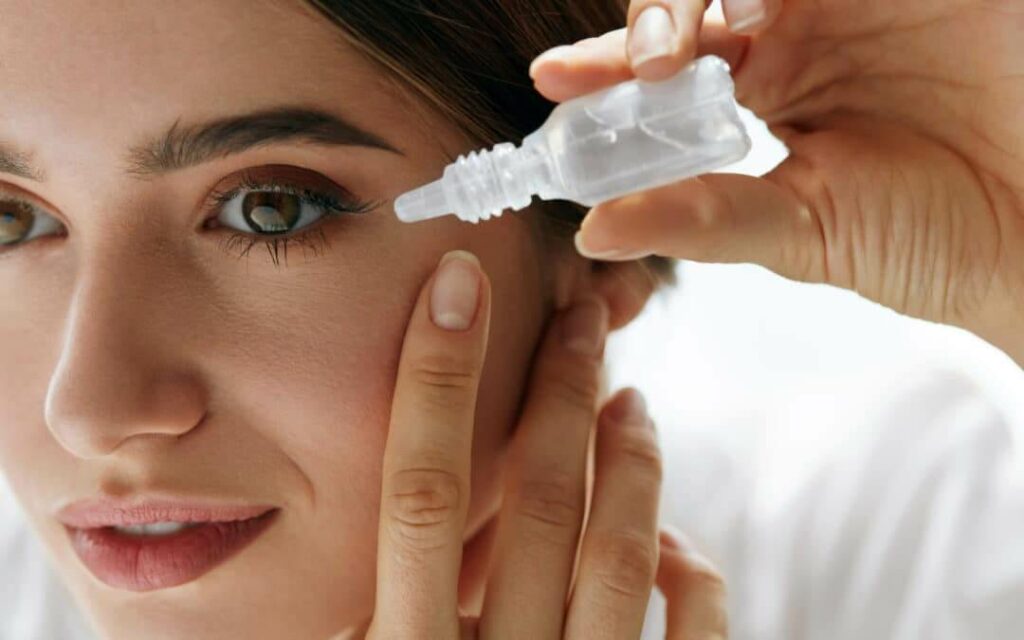Dry Eye: Why Are My Eyes So Dry? Causes, Treatments, and Symptoms of Dry Eye

What is Dry Eye?
Dry eye affects millions of adults in the United States and is more common in women than in men. When the surface of the eye is not adequately lubricated due to a low quantity or quality of tears, dryness occurs.
If tear production decreases, tear evaporation increases, or the composition of tears is imbalanced, dry eye can occur.
The Importance of Tears
Tears are essential to the overall health of our eyes. Our tears have many important functions. Each time we blink, our tears provide protection for our eyes. They also lubricate, remove particles, and keep our eyes smooth. The lubrication helps prevent dry eye.
Tears are made up of three layers; oil (lipid), water (aqueous) and mucin layer (a mixture of oils, water, mucus, proteins) which work to keep the surface of the eye smooth and protected.
Tears continuously lubricate the surface of the cornea in healthy eyes nourishing its cells and adding a layer of protection from harmful environmental factors; such as irritants and allergens. When tears decrease or their composition changes, the health of they eye and vision may become compromised.
Dry Eye Symptoms:
- Stinging or burning
- A scratchy sensation in the eye
- Blurred vision
- Discharge
- Pain
- Redness
- Occasional excess tearing may follow dry periods
Causes of Dry Eye:
- Antidepressants, birth control, hormone replacement therapy, and high blood pressure medications are associated with dry eye
- Dry eye is more common in people over 50 years old
- Dry eye is more likely to develop in women due to hormonal changes which occur in pregnancy and menopause
- Inflammatory diseases which disrupt the Meibomian glands
- Autoimmune disorders, thyroid disorders, and diabetes
- Allergies
- Lack of blinking as a result of prolonged computer use
- Dry or smoky environments
- Laser eye surgery
Dry Eye Treatments
Dry eye syndrome can be chronic and progressive. There are some treatments you can do at home on your own and there are some your doctor will need to prescribe.
At-Home Remedies for Mild Dry Eye Cases
- Artificial tears
- Decrease computer screen time or take multiple breaks
- Warm compresses
- Supplements
- Removing eye makeup and keeping eyes clean
- Wearing protective eyewear and sunglasses
Doctor Recommended and Prescribed Treatments
- Xiidra or Restasis, prescription eye drops
- Steroid eye drops
- Lacrisert, a slow release lubricant
- Punctal plugs help tears remain on the eye’s surface
- Meibomian Gland Expression is an in-office procedure to open the glands and prevent tears from evaporating quickly
- LipiFlow is another in-office procedure which combines warm compresses and Meibomian Gland Expression
- Intense Pulsed Light
Florida Vision Institute
Florida Vision Institute is dedicated to providing state-of-the-art, individually based, high quality, eye health care. Drs. Jack Daubert, J. Kevin Belville, Quentin B. Allen, Rebecca Bobo and Walid Mangal are board- certified, skilled ophthalmologists that provide a range of services to help you attain the clearest vision possible. They will determine the cause of your dry eye, assess your symptoms, and develop the best treatment for you.
The physicians at Florida Vision Institute use state-of-the-art eye-mapping technology to analyze the problems with your eyesight as well as each eye’s unique irregularities. Call us or click here to schedule your appointment today.

